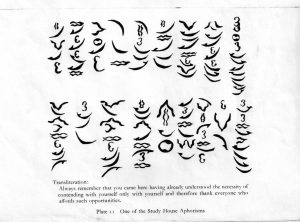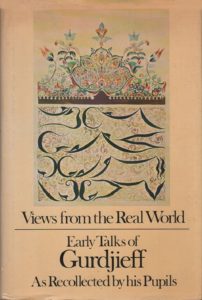
This special cipher script was designed at the Institute for the Harmonious Development of Man at the Prieuré by Alexandre de Salzmann and G.I. Gurdjieff. The latter’s aphorisms were both painted and embroidered in this script around the ceiling of the study house there.
The Brewster Group aphorism project began when, for a Foundation 13th celebration, Tom Forman assigned one of us to paint a sign in the script which said, “Remember yourself always and everywhere.”

At that time the only examples of the script we could find were jacket of Views From the Real World, and one page in a J.G. Bennett book, Gurdjieff: Making a New World. Most of the “characters” and sounds were included in that Bennett book. The description of the phonetic nature of the alphabet made it possible to write in any language. Dushka Howarth, who had grown up at the Prieuré, provided more insight into the script. It was like a secret code children sometimes use. But this was for Prieuré residents, placing a demand on their attention. Everyone was expected to be able to read and write it, and if one did not, he might, for instance, miss dinner.

Dushka shared a copy of what appeared to be a letter on Prieuré letterhead, written in the script from Alexander de Salzmann. The original had belonged to Natalie Etievan. It was in Russian, and written vertically, top to bottom, left to right.
With a Russian dictionary we worked out the phonetics of the “letter,” and discovered several new characters absent from the Bennett book. Then a group member’s Russian colleague at Random House sorted out most of the document’s content from our phonetic approximation. It was not a letter, but a story about a legendary proto-Iranian people called Narts. It was full of spears, heroic deeds, toasts and horses. And from this we were able to assign phonetic sounds to the several new characters.

Thus, as it is based on Russian phonetics, the “alphabet” includes sounds not found in English. And since English also has sounds not found in Russian, compound characters are required to render approximations of certain English phonetics. These include the long “i” sound in right, the “j” sound in judge, and the “ng” sound in wing.
For ten or eleven years at the Brewster Loft, we worked on this project, rendering Gurdjieff’s aphorisms in English in this script. We printed them with linoleum blocks, made frames, and sold them at our craft sales. Our intention was to ultimately create a book, for which Michel de Salzmann once agreed to write an introduction. However, we only completed 25 of the 38 aphorisms, and the project remains unfinished.

